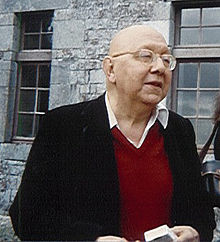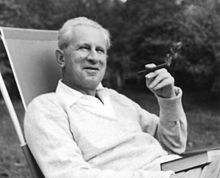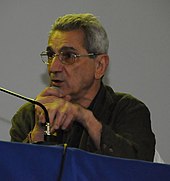User:Гармонический Мир/Libertarian Marxism
| Part of a series on |
| Marxism |
|---|
 |
Libertarian Marxism is a broad scope of
Libertarian Marxism is often critical of
Libertarian Marxism includes currents such as
Overview
| Part of a series on |
| Libertarian socialism |
|---|
 |
Marxism started to develop a libertarian strand of thought after specific circumstances. According to Chamsy Ojelli, "[o]ne does find early expressions of such perspectives in Morris and the Socialist Party of Great Britain (the SPGB), then again around the events of 1905, with the growing concern at the bureaucratisation and de-radicalisation of international socialism".[8]
In December 1884, William Morris established the Socialist League which was encouraged by Friedrich Engels and Eleanor Marx. As the leading figure in the organization, Morris embarked on a relentless series of speeches and talks on street corners as well as in working men's clubs and lecture theatres across England and Scotland. From 1887, anarchists began to outnumber Marxists in the Socialist League.[9] The 3rd Annual Conference of the League held in London on 29 May 1887 marked the change, with a majority of the 24 branch delegates voting in favor of an anarchist-sponsored resolution declaring: "This conference endorses the policy of abstention from parliamentary action, hitherto pursued by the League, and sees no sufficient reason for altering it".[10]
Morris played peacemaker, but he ultimately sided with the anti-parliamentarians, who won control of the Socialist League which consequently lost the support of Engels and saw the departure of Eleanor Marx and her partner Edward Aveling to form the separate Bloomsbury Socialist Society.
Theory
For "many Marxian libertarian socialists, the political bankruptcy of socialist orthodoxy necessitated a theoretical break. This break took a number of forms. The
In rejecting both capitalism and the state, some libertarian socialists align themselves with anarchists in opposition to both capitalist representative democracy and to authoritarian forms of Marxism. Although anarchists and Marxists share an ultimate goal of a stateless society, anarchists criticise most Marxists for advocating a transitional phase under which the state is used to achieve this aim. Nonetheless, libertarian Marxist tendencies such as autonomism and council communism have historically been intertwined with the anarchist movement. Anarchist movements have come into conflict with both capitalist and Marxist forces, sometimes at the same time as in the Spanish Civil War, although as in that war Marxists themselves are often divided in support or opposition to anarchism. Other political persecutions under bureaucratic parties have resulted in a strong historical antagonism between anarchists and libertarian Marxists on the one hand and Leninists, Marxist–Leninists and their derivatives such as Maoists on the other. However, in recent history libertarian socialists have repeatedly formed temporary alliances with Marxist–Leninist groups in order to protest institutions they both reject.
Part of this antagonism can be traced to the
History
20th century
According to Chamsy el-Ojeili, "the most important ruptures are to be traced to the insurgency during and after the First World War. Disillusioned with the capitulation of the social democrats, excited by the emergence of workers' councils, and slowly distanced from Leninism, many communists came to reject the claims of socialist parties and to put their faith instead in the masses". For these socialists, "[t]he intuition of the masses in action can have more genius in it than the work of the greatest individual genius".
In the emerging Soviet state, there appeared
The POUM is viewed as being libertarian Marxist due to its anti-Soviet stance in the Civil War in Spain.
Post-World War II

In the mid-20th century, some libertarian socialist groups emerged from disagreements with
In the
In 1969, French
Notable libertarian Marxist tendencies

De Leonism
De Leonism lies outside the
Council communism

The core principle of council communism is that the state and the economy should be managed by
The Russian word for council is soviet and during the early years of the revolution workers' councils were politically significant in Russia. It was to take advantage of the aura of workplace power that the word became used by Lenin for various political organs. Indeed, the name Supreme Soviet, which the parliament was called and that of the Soviet Union itself, make use of this terminology, but they do not imply any decentralization.
Furthermore, council communists held a critique of the Soviet Union as a capitalist state, believing that the
Council communists also believed in diminishing the role of the party to one of
Left communism
| Part of a series on |
| Left communism |
|---|
 |
Although she lived before left communism became a distinct tendency, Rosa Luxemburg has heavily influenced most left communists, both politically and theoretically. Proponents of left communism have included Amadeo Bordiga, Herman Gorter, Anton Pannekoek, Otto Rühle, Karl Korsch, Sylvia Pankhurst and Paul Mattick.
Prominent
Within Freudo-Marxism

Two Marxist and Freudian psychoanalytic theorists have received the libertarian label or have been associated with it due to their emphasis on anti-authoritarianism and freedom issues.

On the other hand,
Socialisme ou Barbarie

Situationist International
| Part of the Politics series on |
| The Situationist International |
|---|
 |
The
With their ideas rooted in Marxism and the 20th century European artistic avant-gardes, they advocated experiences of life being alternative to those admitted by the capitalist order, for the fulfillment of human primitive desires and the pursuing of a superior passional quality. For this purpose they suggested and experimented with the construction of situations, namely the setting up of environments favorable for the fulfillment of such desires. Using methods drawn from the arts, they developed a series of experimental fields of study for the construction of such situations, like unitary urbanism and psychogeography.
They fought against the main obstacle on the fulfillment of such superior passional living, identified by them in
After publishing in the last issue of the magazine an analysis of the May 1968 revolts and the strategies that will need to be adopted in future revolutions,[43] the SI was dissolved in 1972.[44]
Solidarity
Autonomism

Through translations made available by Danilo Montaldi and others, the Italian autonomists drew upon previous activist research in the United States by the Johnson–Forest Tendency and in France by the group Socialisme ou Barbarie.
It influenced the German and Dutch Autonomen, the worldwide
Communization
The association of the term communization with a self-identified "
The term is still used in this sense in France today and has spread into English usage as a result of the translation of texts by
See also
References
- ^ Herman Gorter, Anton Pannekoek, Sylvia Pankhurst, Otto Ruhl Non-Leninist Marxism: Writings on the Workers Councils. Red and Black, 2007.
- ^ Ernesto Screpanti, Libertarian communism: Marx Engels and the Political Economy of Freedom, Palgrave Macmillan, London, 2007.
- ^ Draper, Hal. "The Principle of Self-Emancipation in Marx and Engels" Archived 2011-07-23 at the Wayback Machine "The Socialist Register." Vol 4.
- ^ Chomsky, Noam. "Government In The Future" Archived 2010-11-21 at the Wayback Machine Poetry Center of the New York YM-YWHA. Lecture.
- ^ "A libertarian Marxist tendency map". Libcom.org. Retrieved 2013-10-11.
- ^ Varoufakis, Yanis. "Yanis Varoufakis thinks we need a radically new way of thinking about the economy, finance and capitalism". Ted. Retrieved 14 April 2019.
Yanis Varoufakis describes himself as a "libertarian Marxist
- ^ Lowry, Ben (11 March 2017). "Yanis Varoufakis: We leftists are not necessarily pro public sector – Marx was anti state". The Wews Letter. Retrieved 14 April 2019.
- ^ a b c d "The 'Advance Without Authority': Post-modernism, Libertarian Socialism and Intellectuals" by Chamsy Ojeili, Democracy & Nature vol.7, no.3, 2001.
- ^ Beer, A History of British Socialism, vol. 2, pg. 256.
- ^ Marx-Engels Collected Works: Volume 48. New York: International Publishers, 2001; pg. 538, fn. 95.
- ^ Noam Chomsky Notes on Anarchism
- ^ Carr, E.H. – The Bolshevik Revolution 1917–1923. W. W. Norton & Company 1985.
- Blackwell Publishing
- ^ Castoriadis, Cornelius (1975). "An Interview". Telos (23)., p. 133
- ^ Castoriadis, Cornelius (1975). "An Interview". Telos (23)., p. 134
- ISBN 1-904859-07-0
- proletarian classdivorced from any meaningful control over production or distribution.
- ^ See, for instance, "Whither China?" by Yang Xiguang.
- ^ The 70s Collective, ed. 1996. China: The Revolution is Dead, Long Live the Revolution. Montreal: Black Rose Books.
- ISBN 0-415-93344-7
- ^ The International Journal of Inclusive Democracy. Inclusivedemocracy.org. Retrieved on 2011-12-28.
- ^ "Libertarian Marxism? by Daniel Guérin". revoltlib.com. 2011-04-23. Retrieved 2013-10-11.
- ^ Charles Shipman, It Had to Be Revolution: Memoirs of an American Radical. Ithaca, NY: Cornell University Press, 1993; pg. 107.
- ^ "How the Socialist Labor Party Differs From the Industrial Workers of the World". www.slp.org. Retrieved 2019-04-14.
- ^ "Council communism - an introduction". libcom.org. Retrieved 2019-04-14.
- ^ "Left-Wing Communism Subject Archive". www.marxists.org. Retrieved 2019-04-14.
- A.S. Neill and Alexander Lowen." "J.6 What methods of child rearing do anarchists advocate?" in An Anarchist FAQby Various Authors.
- ^ "In an earlier article (“Some Thoughts on Libertarianism,” Broadsheet No. 35), I argued that to define a position as “anti-authoritarian” is not, in fact, to define the position at all “but merely to indicate a relationship of opposition to another position, the authoritarian one...On the psychoanalytic side, Wilhelm Reich (The Sexual Revolution, Peter Neville-Vision Press, London, 1951| Character Analysis, Orgone Institute Press, N.Y., 1945; and The Function of the Orgasm, Orgone Institute Press, N.Y., 1942) was preferred to Freud because, despite his own weaknesses – his Utopian tendencies and his eventual drift into “orgones” and “bions” – Reich laid more emphasis on the social conditions of mental events than did Freud (see, e.g., A.J. Baker, “Reich's Criticism of Freud,” Libertarian No. 3, January 1960)." "A Reading List for Libertarians" by David Iverson. Broadsheet No. 39
- ^ "I will also discuss other left-libertarians who wrote about Reich, as they bear on the general discussion of Reich's ideas...In 1944, Paul Goodman, author of Growing Up Absurd, The Empire City, and co-author of Gestalt Therapy, began to discover the work of Wilhelm Reich for his American audience in the tiny libertarian socialist and anarchist milieu." Orgone Addicts: Wilhelm Reich Versus The Situationists. "Orgone Addicts Wilhelm Reich versus the Situationists" by Jim Martin
- ^ "In the summer of 1950-51, numerous member of the A.C.C. and other interested people held a series of meetings in the Ironworkers' Hall with a view to forming a downtown political society. Here a division developed between a more radical wing (including e.g. Waters and Grahame Harrison) and a more conservative wing (including e.g. Stove and Eric Dowling). The general orientation of these meetings may be judged from the fact that when Harry Hooton proposed "Anarchist" and some of the conservative proposed "Democratic" as the name for the new Society, both were rejected and "Libertarian Society" was adopted as an acceptable title. Likewise then accepted as the motto for this Society - and continued by the later Libertarian society - was the early Marx quotation used by Wilhelm Reich as the motto for his The Sexual Revolution, vis: "Since it is not for us to create a plan for the future that will hold for all time, all the more surely what we contemporaries have to do is the uncompromising critical evaluation of all that exists, uncompromising in the sense that our criticism fears neither its own results nor the conflict with the powers that be." "SYDNEY LIBERTARIANISM & THE PUSH" by A.J. Baker, in Broadsheet, No 81, March, 1975. (abridged)
- ^ That he was one of the most radical figures in psychiatry, see Sheppard 1973.
- Danto 2007, p. 43: "Wilhelm Reich, the second generation psychoanalyst perhaps most often associated with political radicalism ..."
- Turner 2011, p. 114: "[Reich's mobile clinic was] perhaps the most radical, politically engaged psychoanalytic enterprise to date."
- For the publication and significance of The Mass Psychology of Fascism and Character Analysis, see Sharaf 1994, pp. 163–164, 168.
- For Character Analysis being an important contribution to psychoanalytic theory, see:
- Young-Bruehl 2008, p. 157: "Reich, a year and a half younger than Anna Freud, was the youngest instructor at the Training Institute, where his classes on psychoanalytic technique, later presented in a book called Character Analysis, were crucial to his whole group of contemporaries."
- Sterba 1982, p. 35: "This book [Character Analysis] serves even today as an excellent introduction to psychoanalytic technique. In my opinion, Reich's understanding of and technical approach to resistance prepared the way for Anna Freud's Ego and the Mechanisms of Defence (1936)."
- Guntrip 1961, p. 105: "... the two important books of the middle 1930s, Character Analysis (1935) by Wilhelm Reich and The Ego and the Mechanisms of Defence (1936) by Anna Freud."
- For more on the influence of The Mass Psychology of Fascism, see Kirkpatrick 1947, Burgess 1947; Bendix 1947; and Turner 2011, p. 152.
- ^ For Anna Freud, see Bugental, Schneider and Pierson 2001, p. 14: "Anna Freud's work on the ego and the mechanisms of defense developed from Reich's early research (A. Freud, 1936/1948)."
- For Perls, Lowen and Janov, see Sharaf 1994, p. 4.
- For the students, see Elkind, 18 April 1971; and Turner 2011, pp. 13–14.
- ^ Sharaf 1994, pp. 419, pp. 460–461.
- ^ Sex-Pol stood for the German Society of Proletarian Sexual Politics. Danto writes that Reich offered a mixture of "psychoanalytic counseling, Marxist advice and contraceptives," and argued for a sexual permissiveness, including for young people and the unmarried, that unsettled other psychoanalysts and the political left. The clinics were immediately overcrowded by people seeking help. Danto, Elizabeth Ann (2007). Freud's Free Clinics: Psychoanalysis & Social Justice, 1918–1938, Columbia University Press, first published 2005., pp. 118–120, 137, 198, 208.
- ^ The Sexual Revolution, 1945 (Die Sexualität im Kulturkampf, translated by Theodore P. Wolfe)
- ^ Douglas Kellner Herbert arcuse
- ^ Marcuse, Herbert. Eros and Civilization, 2nd edition. London: Routledge, 1987.
- ^ a b Young, Robert M. (1969).THE NAKED MARX: Review of Herbert Marcuse, Eros and Civilization: A Philosophical Inquiry into Freud, New Statesman, vol. 78, 7 November 1969, pp. 666-67
- ^ Douglas Kellner "Marcuse, Herbert" Archived 2012-02-07 at the Wayback Machine
- ^ Howard, Dick (1975). "Introduction to Castoriadis". Telos (23): 118.
- ^ Castoriadis, Cornelius (1975). "An Interview". Telos (23): 133.
- ^ Castoriadis, Cornelius (1975). "An Interview". Telos (23): 134.
- ^ The Beginning of an Era (part1, part 2) Situationist International #12, 1969
- ^ Karen Elliot (2001-06-01). "Situationism in a nutshell". Barbelith Webzine. Archived from the original on 2008-05-09. Retrieved 2008-06-23.
- ^ Now collected in a book, Maurice Brinton, For Workers' Power.
- ISBN 9780826458148.
- ISSN 1089-7011.
- ^ Benjamin Noys (ed). Communization and its Discontents: Contestation, Critique, and Contemporary Struggles. Minor Compositions, Autonomedia. 2011. 1st ed.
- ^ "As we apprehend it, the process of instituting communism can only take the form of a collection of acts of communisation, of making common such-and-such space, such-and-such machine, such-and-such knowledge. That is to say, the elaboration of the mode of sharing that attaches to them. Insurrection itself is just an accelerator, a decisive moment in this process." Anonymous, Call Archived 2011-07-21 at the Wayback Machine
- ^ For a critique of Tiqqun from an ultra-left perspective, as well as a description of the opposition between the two sense of "communization" See also Dauvé and Nesic, "Un Appel et une Invite".
- ^ See e.g. "After the Fall: Communiqués from Occupied California" Archived 2011-01-26 at the Wayback Machine
Bibliography
- Pioneers of Anti-Parliamentarism by Guy Aldred. Glasgow: Bakunin Press.
- Non-Leninist Marxism: Writings on the Workers Councils (a collection of writings by Gorter, Pannekoek, Pankhurst, and Ruhle). Red and Black Publishers, St Petersburg, Florida, 2007. ISBN 978-0-9791813-6-8.
- The International Communist Current, itself a Left Communist grouping, has produced a series of studies of what it views as its own antecedents. The book on the German-Dutch current, which is by Philippe Bourrinet (who later left the ICC), in particular contains an exhaustive bibliography.
- The Italian Communist Left 1926–1945 (ISBN 1897980132).
- The Dutch-German Communist Left (ISBN 1899438378).
- The Russian Communist Left, 1918–1930 (ISBN 1897980108).
- The British Communist Left, 1914–1945 (ISBN 1897980116).
- The Italian Communist Left 1926–1945 (
- (in French) L'Autonomie. Le mouvement autonome en France et en Italie, éditions Spartacus 1978.
- Benjamin Noys (ed). Communization and its Discontents: Contestation, Critique, and Contemporary Struggles. Minor Compositions, Autonomedia. 2011. 1st ed.
- Beyond post-socialism. Dialogues with the far-left by Chamsy el- Ojeili. Palgrave Macmillan. 2015.
External links
- "Libertarian Marxism?" by Daniel Guérin.
- Situationist International online.
- "Libertarian Marxism's Relation to Anarchism" by Wayne Price.
- "Franz Kafka and Libertarian Socialism" by Michael Löwy.
- For Communism – John Gray WebSite: large online library of libertarian communist texts.
- Left Communism collection on the Marxists Internet Archive.
- "The Libertarian Marxism of Andre Breton" by Michael Löwy.
